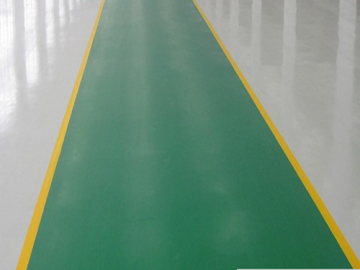Epoxy Floor Paint is resistant to strong acids and alkalis, wear, pressure, impact, mold, water, dust, slip, as well as static electricity and electromagnetic waves. It comes in bright and diverse colors and is easy to clean.
Epoxy Floor Paint is widely used in electronics factories, machinery manufacturing plants, hardware factories, pharmaceutical factories, automobile factories, hospitals, aerospace bases, laboratories, offices, markets, paper mills, chemical factories, plastic processing plants, textile factories, tobacco factories, candy factories, breweries, beverage factories, meat processing plants, parking lots, and other surface coatings.
So how should we choose Epoxy Floor Paint?
1. Floor Position
Determine whether moisture-proof treatment is needed or if a special moisture-proof floor should be directly chosen based on whether the Epoxy Floor Paint is on the underground floor or the ground floor.
2. Base Condition
① Base strength: Generally requires compressive strength ≥20Mpa
② Flatness: Should we use epoxy mortar for repair?
3. Aesthetic Requirements
Color requirements: Is it necessary to have colors or color-divided areas?
4. Mechanical Function Requirements
The following three aspects are primary:
① Wear resistance: What types of vehicles will run on the Epoxy Floor Paint during use? Will there be large forklifts?
② Pressure resistance: What load will the Epoxy Floor Paint bear during use? Are there heavy-duty vehicles?
③ Impact resistance: Will the impact force cause peeling of the Epoxy Floor Paint surface?
5. Chemical Function Requirements
Consider the following two aspects:
① Acid and alkali resistance: Types and concentrations of corrosive chemicals the Epoxy Floor Paint will be exposed to during use.
② Solvent resistance: Types of solvents and contact time during the use of Epoxy Floor Paint.













